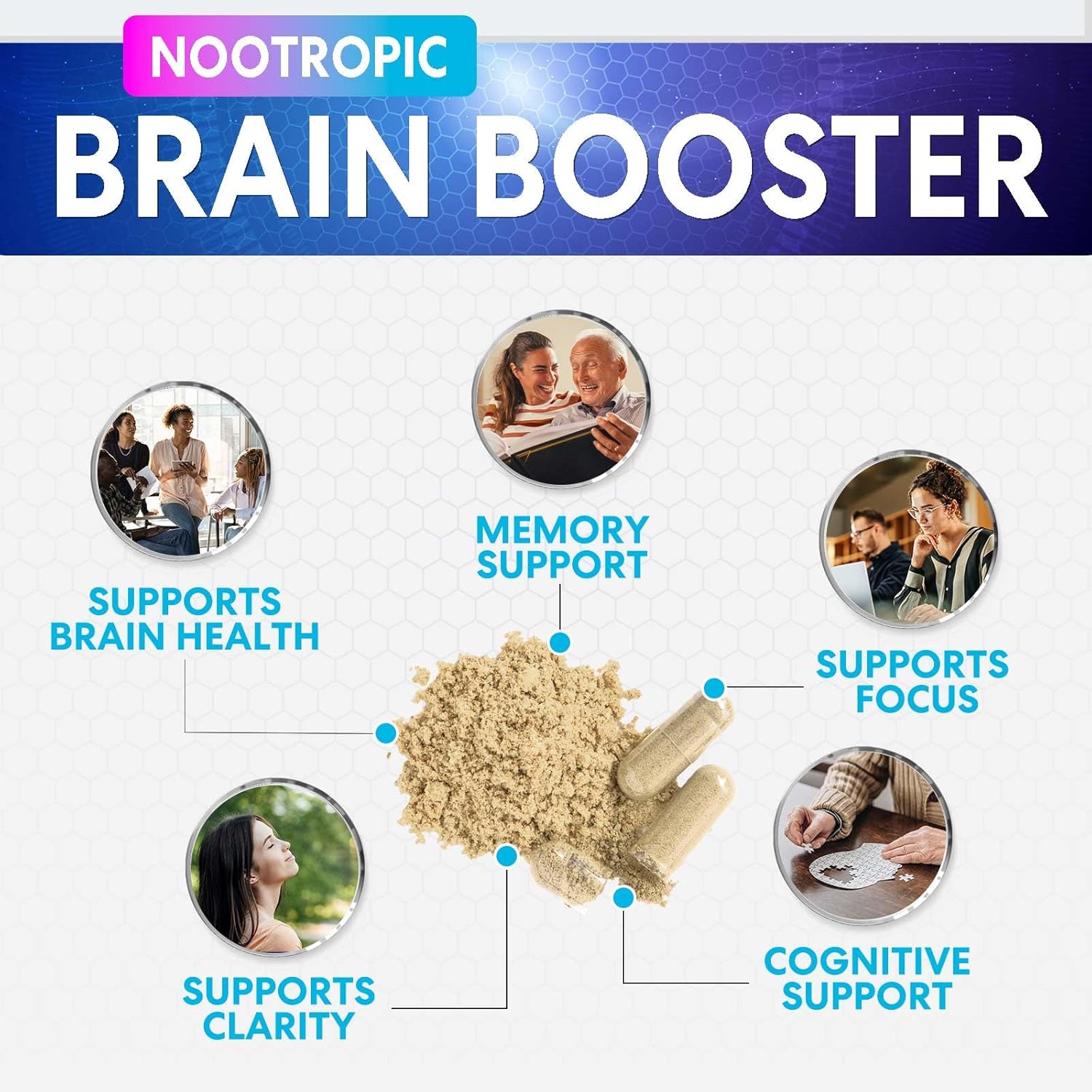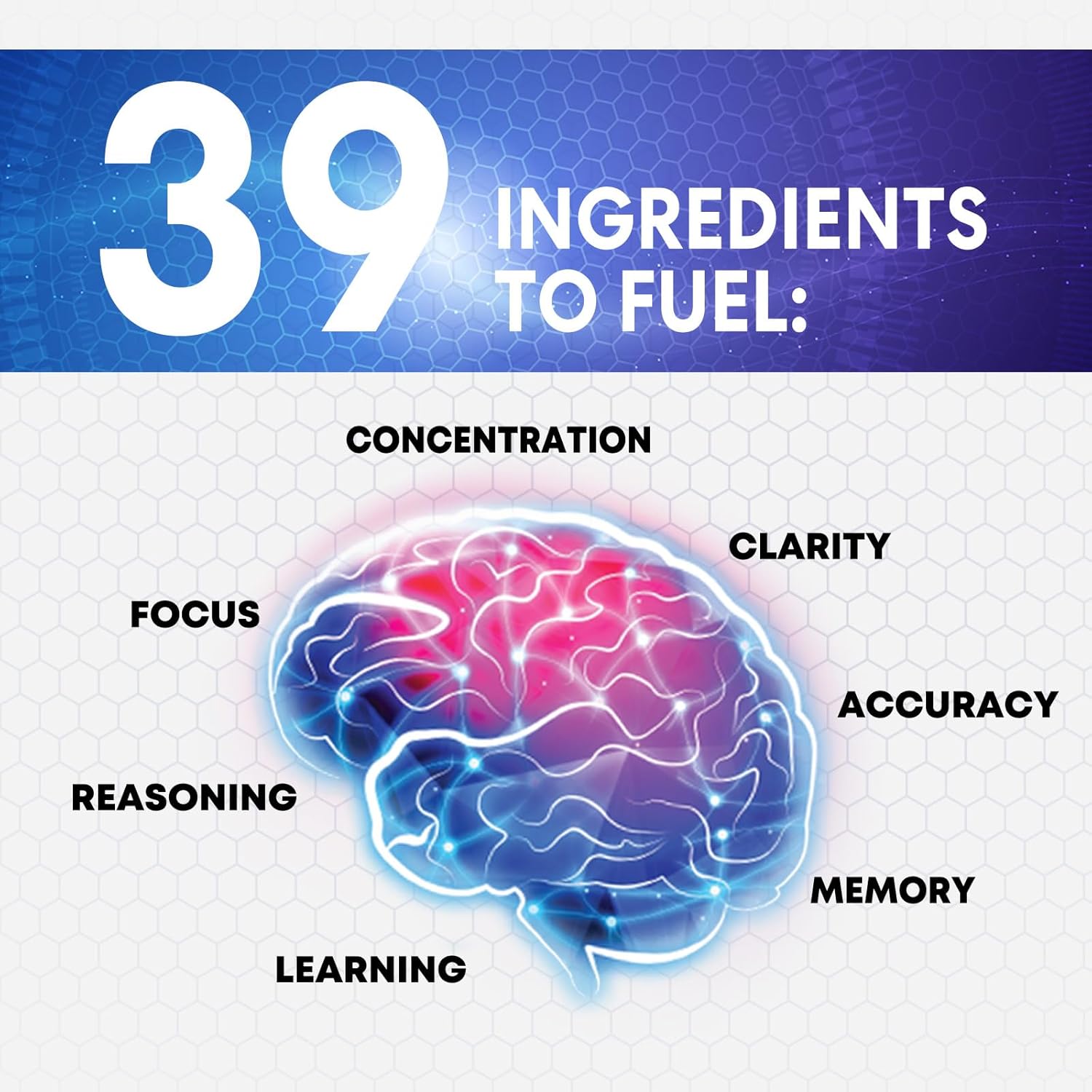








Price: $14.42
(as of Apr 02, 2025 14:02:38 UTC - Details)
What Are the Best Vitamins for Brain Health? A Comprehensive Guide
Introduction
When it comes to brain health, the right vitamins play a crucial role in maintaining cognitive function and overall mental well-being. Many people wonder, "What are the best vitamins for the brain?" This question leads us to explore a variety of essential nutrients that can support brain function, enhance memory, and even improve mood. In this article, we'll delve into some of the most beneficial vitamins and supplements for brain health, ensuring you have all the information you need to make informed choices.
Whether you're looking to boost your memory, improve focus, or simply maintain a healthy brain as you age, understanding which vitamins are most effective is key. Let's dive into the world of brain-boosting nutrients and discover how they can enhance your cognitive abilities.
1. Omega-3 Fatty Acids: The Brain's Best Friend
Why Omega-3s Matter for Brain Health
When discussing the best vitamins for brain function, it's impossible to overlook omega-3 fatty acids. These essential fats are vital for maintaining healthy brain structure and function. Studies have shown that omega-3s can support memory and cognitive performance while reducing the risk of neurodegenerative diseases.
Where to Find Omega-3s
You can find omega-3 fatty acids in various sources, including fatty fish like salmon, walnuts, flaxseeds, and chia seeds. For those who don't consume fish regularly, omega-3 supplements, such as fish oil or algae oil, can be a great alternative.
Incorporating Omega-3s into Your Diet
To boost your omega-3 intake, try to include fatty fish in your meals at least twice a week. If you're vegetarian or vegan, consider adding flaxseeds or walnuts to your smoothies or salads. Taking a high-quality omega-3 supplement can also help bridge the gap.
2. B Vitamins: The Cognitive Powerhouse
The Role of B Vitamins in Brain Function
B vitamins, including B6, B9 (folate), and B12, are essential for brain health. These vitamins are involved in the production of neurotransmitters, which are crucial for communication between brain cells. A deficiency in B vitamins can lead to cognitive decline and memory issues.
Food Sources of B Vitamins
You can find B vitamins in a variety of foods. For instance, leafy greens, legumes, eggs, and dairy products are excellent sources. Incorporating a balanced diet rich in these foods can help ensure you get enough B vitamins to support cognitive health.
Tips for Increasing B Vitamin Intake
To boost your B vitamin intake, consider adding more whole grains, nuts, and seeds to your diet. A morning smoothie with spinach, bananas, and yogurt is an easy way to pack in several B vitamins at once.
3. Vitamin D: The Sunshine Vitamin
Vitamin D's Impact on Brain Health
Vitamin D is often referred to as the "sunshine vitamin" because our bodies produce it when exposed to sunlight. However, many people have low levels of vitamin D, especially during the winter months. Research suggests that vitamin D plays a role in brain health and may help protect against cognitive decline.
Sources of Vitamin D
You can obtain vitamin D from sunlight, fatty fish, fortified dairy products, and supplements. If you live in an area with limited sunlight, especially during winter, a vitamin D supplement might be necessary.
Ensuring Adequate Vitamin D Levels
To maintain optimal vitamin D levels, aim for some sunlight exposure each day. If that's not possible, consider a daily supplement, especially if you have darker skin or spend most of your time indoors.
4. Antioxidants: Protecting Your Brain
The Importance of Antioxidants for Cognitive Function
Antioxidants are compounds that help protect your cells from damage caused by free radicals. They are essential for maintaining brain health and preventing neurodegenerative diseases. Vitamins like C and E are powerful antioxidants that can support cognitive function.
Foods Rich in Antioxidants
Fruits and vegetables are excellent sources of antioxidants. Berries, citrus fruits, nuts, and green leafy vegetables are particularly high in these beneficial compounds. Including a variety of colorful fruits and vegetables in your diet can help you get the antioxidants your brain needs.
Simple Ways to Add Antioxidants to Your Diet
Start your day with a berry smoothie or snack on nuts throughout the day. Adding spinach to your salads or sandwiches can also boost your antioxidant intake without much effort.
5. Vitamin E: A Key Player in Cognitive Health
How Vitamin E Supports Brain Function
Vitamin E is another powerful antioxidant that plays a crucial role in brain health. It helps protect brain cells from oxidative stress and may support overall cognitive function. Some studies suggest that vitamin E may even reduce the risk of Alzheimer's disease.
Sources of Vitamin E
You can find vitamin E in foods like almonds, sunflower seeds, and avocados. Incorporating these foods into your diet can help ensure you get enough vitamin E for optimal brain health.
Incorporating Vitamin E into Your Meals
Try snacking on almonds or adding sunflower seeds to your salads. A drizzle of olive oil on your vegetables can also provide a healthy dose of vitamin E.
6. Ginkgo Biloba: Ancient Wisdom for Modern Minds
The Benefits of Ginkgo Biloba
Ginkgo biloba is an herbal supplement that has been used for centuries to enhance cognitive function. It is believed to improve blood flow to the brain and may help with memory and concentration. Many people turn to ginkgo biloba as a natural way to support brain health.
How to Use Ginkgo Biloba
Ginkgo biloba is available in various forms, including capsules and teas. If you're considering trying it, be sure to follow the recommended dosage on the product label.
Precautions When Using Ginkgo Biloba
While ginkgo biloba is generally safe for many people, it's crucial to consult with a healthcare provider before starting any new supplement, especially if you are taking medications or have existing health conditions.
Conclusion
In summary, when it comes to maintaining optimal brain health, incorporating the right vitamins and nutrients into your diet is essential. Omega-3 fatty acids, B vitamins, vitamin D, antioxidants, and vitamin E all play significant roles in supporting cognitive function and overall brain health. Additionally, herbal supplements like ginkgo biloba can provide a natural boost.
Make it a priority to include these essential nutrients in your daily meals and consider supplements when necessary. By doing so, you'll be taking proactive steps to support your brain health and enhance your cognitive abilities for years to come. Remember, your brain is your most valuable asset—nourish it wisely!
Focus & Clarity Support: Formulated to support focus and clarity, this brain supplement combines key nutrients to support brain performance during your busiest days
Nootropic Nutrient Blend: Crafted with Bacopa, Vitamins, Phosphatidylserine, DMAE, Choline, and Huperzine, this nootropic formula supports concentration and memory retention
Sustained Energy Without the Jitters: Designed for energy support, this supplement support sharpness throughout the day without sudden crashes or brain fog
Easy to Swallow, No Strong Taste: Our smooth coated capsules are designed for ease of swallowing, with no overpowering taste or odor these capsules are formulated for easy digestion and absorption
Brain Supplement Memory Pills by Nature's Peak: brain supplement memory pills for adults and best gingko biloba capsules cerebro concentration el energy ginkgo gummies health kids la lions mane memoria men nootropics para pastillas pill seniors support vitamins women ginko neuro phosphatidylserine with b12 b6 food strength advanced extra plus vitamina 120mg 60 herbal bacopa monnieri mushrooms
